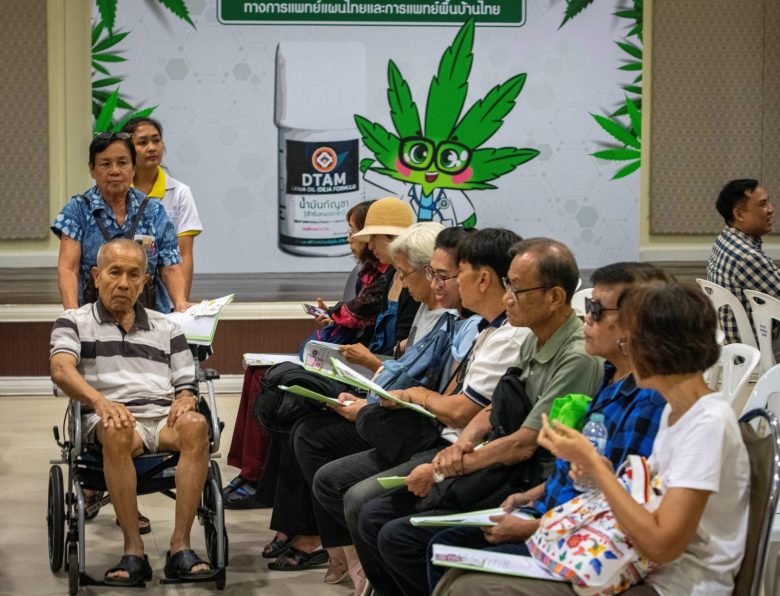BANGKOK – High on hope, foreigners have arrived in Thailand selling satellite imagery, financial services, grow lights and other products to profit from the kingdom’s recently legalized and fast-budding medical marijuana industry before Thais figure out how to do it themselves.
Foreign investors are excitedly gathering at cannabis networking events in Bangkok and elsewhere in this Southeast Asian nation, spouting sales spiels and describing the most fantastic things since seedless joints.
They are also unraveling Thailand’s newly created tangle of cannabis laws to find loopholes and ways to squeeze money from weed.
Medical marijuana became legal in Thailand in 2019. Recreational use did not and penalties for smoking without a prescription still include imprisonment.
As a result, the current foreign investment-driven rush is going mainly towards niche infrastructure for government-controlled medical research and production.
The Dutch, for instance, are quickly emerging as big suppliers of potent seeds to Thai medical marijuana growers.
The Netherlands, where recreational marijuana is legal, has spent decades producing some of the best cross-bred seeds, which are now being purchased by government-approved Thai researchers.

Dave Rockwood, who came to Thailand from Utah, said he wants his AgriTech Global Services’ software and satellite link to help Thai farmers “evaluate their land to see if it is a good location and has good soil conditions, weather conditions, and enough skilled cultivators for cannabis growing, harvesting and processing cannabis crops.”
He says farmers can receive printed scans created by his company’s satellite links and software, which produce color-coded maps and other data to reveal if their dirt is suitable for growing marketable weed.
“We help analyze the land by utilizing historical satellite scans over the past few years with historical weather data, and run this data through our proprietary artificial intelligence software engine to determine the suitability of that land for cannabis,” Rockwood said in an interview.
He said that related ground sensors will help Thai weed farmers to continually monitor their plants’ growth and that satellite monitoring will assist in forecasting crop yields.
Some sectors where foreigners can compete with Thais “include technology through cultivation and extraction, genetics, and lifestyle branding through fashion and accessories,” Josh Schmidt, co-founder of the US-based Pistil Point and Capital Hemp companies involved respectively in medicinal cannabis and industrial hemp, said in an interview.
He was upbeat during a recent cannabis exhibition in Bangkok, but said, “Due to compliance, there was no showcasing of the actual plant or its derivatives in any way. It would be nice if the government helps organizers, through collaborations, to introduce cannabis and hemp to first timers.”

Daniel Foxman, the American managing director of Thai Freeze Dry, is already involved in freeze-drying herbs in and around Thailand’s second biggest city, Chiang Mai, where he lives.
His company, which also represents California-based Delta Separations, hopes to soon include marijuana grown in Thailand.
“Cannabis is one of the many medicinal herbs we will process,” Foxman said in an interview.
“Thai Freeze Dry is now well along in our progress to build a factory complex that will include three factories — a much larger freeze-dry factory, a sprouting facility, and an extraction factory.
“We will sprout hemp seeds and then freeze-dry the hemp seed sprouts using ‘cellular fraction-line’ freeze-drying technology,” he said.
Foxman said this may result in cannabis products that can be classified as dietary supplements or functional foods. Cannabis roots, he noted, “have been used for centuries for pain relief.”
Patience and deep pockets are vital.

“We do not see this as a profitable enterprise for perhaps the next few years. If you are looking to ‘get rich quick,’ I don’t think that the cannabis market in Thailand is your best bet,” Foxman said.
Networking exhibitions in English and Thai have appeared in spacious five-star hotel conference rooms and cramped reggae-themed hipster cafes, where entrepreneurs exchange name cards, boast of their products’ uniqueness, and listen to tutorials about the fast-evolving scene.
Bangkok-based Elevated Estate has been arranging the most popular networking and exhibition venues for Thai and international cannabis businesses, and recently attracted Schmidt, Foxman, Rockwood and hundreds of others.
Elevated Estate’s exhibitions and meetings provide “anything from finding information, checking fake news, learning about business potential, updates on cannabis law, getting assistance, hosting a business-to-business cannabis expo where businesses can showcase their products and services, as well as learn from global and local cannabis experts,” Thai founder Chokwan “Kitty” Chopaka said in an interview.

She said many cannabis-related sectors are open to foreigners, but not “plant touching, especially cannabis production. Thais have a very strong nationalistic feeling about cannabis, almost as much as land.”
Elevated Estate’s meetings also bring in local and foreign cannabis-linked professionals who discuss the latest technology, extraction machines, medical breakthroughs, and other hot topics.
Vendors who set up exhibition booths at Elevated Estate’s networking events have included legal services, investment advisors, agricultural consultants and, for more laid-back consumers, even bong cleaners.
Richard S Ehrlich is a Bangkok-based American correspondent reporting from Asia since 1978.


